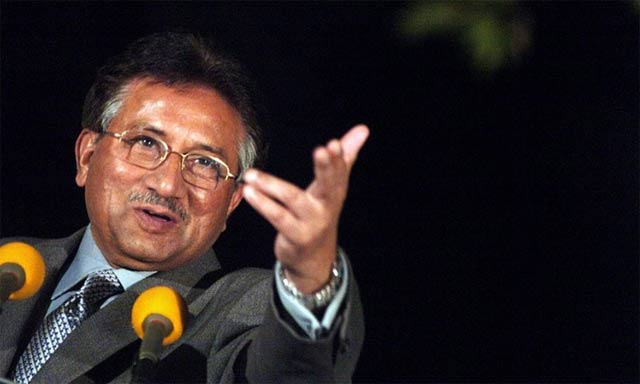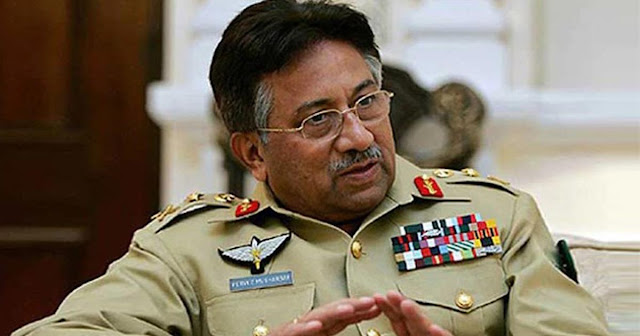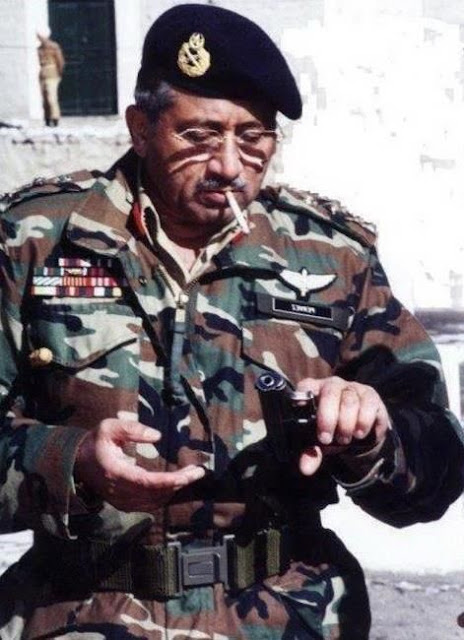Pervez Musharraf Fast Facts/ Was Pervez Musharraf a good Prime Minister of Pakistan?
Pervez Musharraf is a Pakistani former
politician and a retired 4-star decorated army General who became the 10
president of Pakistan after the successful navy takeover of the federal
government in 1999. Musharraf rose to countrywide prominence while he was
promoted to four-star general Prime Minister Nawaz Sharif in 1998, making
Musharraf the head of the armed forces. He led the Kargil infiltration that
almost delivered India and Pakistan to a full-fledged warfare in 1999.
On 14 October
1999, Musharraf appeared on TV to declare a state of emergency and issued a
Provisional Constitutional Order that in the long run suspended the writ of the
Constitution of Pakistan and dissolved the National Assembly and 4 provincial
assemblies, although they left Muhammad Rafiq Tarar in workplace as.

General
Pervez Musharraf led a Army coup in Pakistan in October 1999. He overthrew
democratically elected authorities and declared himself the Chief Executive of
the state. Later he modified his resignation to President. In 2002, he held a
referendum within the use of a granted him a 5 year extension.
Pakistan
below General Parvez Musharraf was not called democratic government because the
rulers had no longer been elected by the Pakistani public. People might have
elected their representatives to the countrywide in addition to the provincial
assemblies however a lot of these elected representatives were now not clearly
considered because the rulers.
General
Pervez Musharraf led an army coup in 1999 and overthrew the democratically
elected authorities in Pakistan. He declared himself 'Chief Executive' of the
nation.
Former
officers related to his authority’s factor out that it become a
nicely-notion-out flow via the army authorities to enact new and liberal laws
to create operating space for non-public information channels. It’s possible
that it didn’t arise to the military status quo that the brand new forces of
media freedom they had unleashed would eventually turn in opposition to them.
A
retired reputable related to Musharraf’s presidency says the military idea that
Pakistani news channels would “pull the Pakistani public far from watching
Indian news channels a habit which became harming the use of a’s country wide
interests badly”.
But
for lots, this media revolution turned into nothing more than a phantasm. In
their opinion, Musharraf’s regime had begun the use of high-surpassed tactics
in opposition to reporters an awful lot before the primary political disaster
his government confronted in March 2007, while the prison network began a
political campaign in opposition to his authorities. Musharraf had sacked the
then sitting Chief Justice of Pakistan, which was accompanied by way of a
countrywide protest via the criminal fraternity. Many senior media
personalities got here out in the open in opposition to the authorities and in
help of the attorneys.
Mazhar
Abbas, the former secretary fashionable of the Pakistan Federal Union of
Journalists, says, “Many human beings idea that General Musharraf banned the
media on November three, 2007, however the process had started out a great deal
earlier. Early that year., channels obtained a display-purpose notice
declaring: ‘No program shall be aired which contains (a) aspersions against the
judiciary and the defense force, (b) any material amounting to contempt of
courtroom, (c) include any abusive feedback that once taken in context,
generally tend to or are in all likelihood to expose any individual or group or
a class of people to hatred or contempt’.”

Kargil
and the advent of private channels
The
authorities’ pass to liberalize media legal guidelines in Pakistan changed into
sparked by means of an army campaign in 1999 when General Musharraf was serving
as Chief of the Army Staff and had not but staged a coup.
In
May 1999, Musharraf launched an incursion into Kargil, a mountainous location
of Indian Kashmir. Here the Pakistani and Indian armies faced each different at
18,000 ft. In the spring of 1999, Musharraf sneaked his troops in early, taking
the empty Indian positions without a combat. The next war had Pakistan beaten
again, chickening out under US stress.
At
that point, Pakistan Television (PTV) was the handiest source for TV news.
Ironically PTV’s credibility among the Pakistani public become so low that the
latter grew to become to Indian news channels for the trendy facts at the
Kargil army crisis. In the ones days, the prices of unlawful satellite dishes
soared, because it changed into the most effective source to receive
transmissions of Indian information channels.
“While
the Pakistan navy become combating the Indians within the mountains of Kashmir,
the Pakistani public became extra keen to pay attention to Indian reality
created by Indian information channels,” says a senior legitimate of the
Musharraf government. The retired authority’s official says this became whilst
Musharraf made his plans to introduce personal information channels in
Pakistan—and his opportunity came when he became President after an October
1999 coup.
The
Pakistani media turned out to be extraordinarily nationalistic. But at the
equal time, some sections of it transformed into extraordinarily pro-democracy
pressure. This changed into worrying for the Musharraf authorities. M
Zia-uddin, a veteran journalist and the previous editor of Dawn, says the
media, as a public quarter industry, emerged as “the handiest
seasoned-democracy force inside the country”, something corroborated by way of
senior journalist and political analyst Fasih-ur-Rehman.
The
Musharraf government was ousted from energy earlier than it is able to do
whatever to force any alternate within the media. But the media’s later
“excesses” pressured Musharraf’s successors in the navy to contemplate a shift
in policy in the direction of the clicking.
Pervez Musharraf Fast Facts
Birth
Place: New Delhi, India
Birth name: Pervez
Musharraf
Father: Syed
Musharraf Uddin, career diplomat
Mother: Begum
Zarin Musharraf
Marriage: Sehba
Musharraf (December 1968-present)
Children: Ayla;
Bilal
Education: Pakistan
Military Academy, 1961; Military Academy of Kakul, 1964
Religion: Muslim
Timeline
1947 - Musharraf's
family moves to Pakistan when British India is divided into India and Pakistan.
The family settles in Karachi.
1949-1956 - Spends
his early childhood in Turkey due to his father's assignment in Ankara.
1964 - Is
commissioned second lieutenant in an artillery regiment in the Pakistani Army.
1965 - Is
awarded Imtiazi Sanad (medal) for gallantry during the 1965 India-Pakistan war.
1971 - Is
a company commander in a commando battalion during the India-Pakistan war.
1991 - Is
promoted to major general.
October 7, 1998 - Is
appointed chief of army staff with the rank of general.
April 9, 1999 - Is
appointed chairman of the Joint Chiefs of Staff.
October 12, 1999 - Leads
a coup against PM Nawaz Sharif and becomes head of government. Sharif had
previously fired Musharraf after the army's failed invasion in Kargil, in
Indian-held Kashmir.
June
20, 2001 - Appointed himself as a PM of
Pakistan while remaining the head of the army.
April 30, 2002 - A
referendum is held on whether Musharraf will hold office for another five
years; it passes by a wide margin.
August 2002 - Implements
29 amendments to the constitution, granting himself the power to dissolve
parliament and remove the prime minister.
December 14 and 25, 2003 - Two
assassination attempts on Musharraf's life fail.
January 1, 2004 - A
vote of confidence in parliament allows Musharraf to remain in power until
2007. He gains the votes he needs by promising to step down as head of the army
at the end of 2004.
September 25, 2006 - Musharraf
autobiography, "In the Line of Fire," is published.
October 6, 2007 - An
unofficial vote count indicates Musharraf has won by a landslide in a
presidential election. A number of parliamentarians boycotted the vote in both
houses.
November 3, 2007 - President
Musharraf declares a state of emergency in Pakistan. He suspends the country's
constitution, postpones January 2008 elections, and imposes restrictions on the
media. Government authorities arrest 1,500 people who protest the state of
emergency.
November 28, 2007 - Steps
down as leader of Pakistan's army, the day before he is scheduled to be sworn
in as president.
November 29, 2007 - Takes
the presidential oath of office for the third time.
December 15, 2007 - The
state of emergency is lifted.
February 18, 2008 - In
parliamentary elections, Musharraf's party, the Pakistan Muslim League-Q,
finishes third in voting, behind the PPP, party of the late Benazir Bhutto, and
the Pakistan Muslim League-N, party of former PM Nawaz.
August 18, 2008 - Announces
his resignation as president of Pakistan.
July 31, 2009 - Pakistan's
Supreme Court rules that Musharraf violated the constitution by unlawfully
declaring emergency rule on November 3, 2007. The court gives him seven days to
appear and defend himself.
August 6, 2009 - Refuses
to answer the charges against him and flees Pakistan for Great Britain.
August 11, 2009 - Pakistani
officials announce that Musharraf faces arrest if he returns to Pakistan.
October 1, 2010 - Launches
a new political party, the ' All Pakistan Muslim Lique'
February 12, 2011 - A
warrant for Musharraf's arrest is issued by a Pakistani court, in connection
with the assassination of former Prime Minister Bhutto.
May 24, 2011 - In
an interview on CNN piers Morgan, Musharraf condemns the raid that
killed Osama Bin laden in Pakistan. He says, "No country has a
right to intrude into any other country...Actually, technically, if you see it
legally, it's an act of war."
March 16, 2013 - Musharraf
announces his plans to return to Pakistan to lead his party in the upcoming
elections.
March 23, 2013 - The
Pakistani Taliban says that it will assassinate Musharraf if he returns to the
country.
March 24, 2013 - Musharraf
returns to Pakistan after four years in exile. He is granted bail in advance of
his arrival in Pakistan, so he is not arrested upon return.
April 18, 2013 - A
Pakistani court rejects Musharraf's request for a bail extension and orders his
arrest in a case he is facing over the detention of judges in 2007. Pakistani
media reports that Musharraf has ben placed under house arrest.
August 20, 2013 - A
Pakistan court indicts Musharraf, charging him with murder in the death of
Bhutto.
March 31, 2014 - A
Special Court in Pakistan charges Musharraf with high treasons.
April 3, 2014 - A
bomb detonates a few minutes after Musharraf's convoy passes through an
intersection in Islamabad as he is being transported home from a military
hospital. Pakistani police say it is an assassination attempt against
Musharraf. No one is injured.
January
18, 2016 - Musharraf and two other former officials
are acquitted by an anti-terrorism court in the killing of Nawab Akbar
Khan Bugti, a Baloch nationalist leader.
February 11, 2016 - After
experiencing breathlessness, Musharraf is rushed to Pakistan Navy ship shifa
hospital to undergo testing, he receives treatment for complications related to
a heart condition, according to his spokesperson.
March 16, 2016 - Pakistan's
Supreme Court lifts a travel ban on Musharraf allowing him to leave the country
while he awaits trial for treason. Two days later Musharraf leaves Pakistan in
order to seek medical treatment in Dubai.
August 31, 2017
- A court in Pakistan names Musharraf a fugitive from
justice in the assassination of Bhutto. Musharraf has been
living in self-imposed exile in Dubai since 2016.
December 17, 2019 -
Musharraf sentenced to death after a three-member special court in
Islamabad convicts him of violating the constitution by unlawfully declaring
emergency rule while he was in power.
January
13, 2020 - Pakistan, Lahore HC overturns Musharaf's
death sentence. Musharraf, who has been living in self-imposed
exile in Dubai since 2016, can freely return to Pakistan.
1947 - Musharraf's
family moves to Pakistan when British India is divided into India and Pakistan.
The family settles in Karachi.
1949-1956 - Spends
his early childhood in Turkey due to his father's assignment in Ankara.
1964 - Is
commissioned second lieutenant in an artillery regiment in the Pakistani Army.
1965 - Is
awarded Imtiazi Sanad (medal) for gallantry during the 1965 India-Pakistan war.
1971 - Is
a company commander in a commando battalion during the India-Pakistan war.
1991 - Is
promoted to major general.
October 7, 1998 - Is
appointed chief of army staff with the rank of general.
April 9, 1999 - Is
appointed chairman of the Joint Chiefs of Staff.
October 12, 1999 - Leads
a coup against PM Nawaz Sharif and becomes head of government. Sharif had
previously fired Musharraf after the army's failed invasion in Kargil, in
Indian-held Kashmir.
June
20, 2001 - Appointed himself as a PM of
Pakistan while remaining the head of the army.
April 30, 2002 - A
referendum is held on whether Musharraf will hold office for another five
years; it passes by a wide margin.
August 2002 - Implements
29 amendments to the constitution, granting himself the power to dissolve
parliament and remove the prime minister.
December 14 and 25, 2003 - Two
assassination attempts on Musharraf's life fail.
January 1, 2004 - A
vote of confidence in parliament allows Musharraf to remain in power until
2007. He gains the votes he needs by promising to step down as head of the army
at the end of 2004.
September 25, 2006 - Musharraf
autobiography, "In the Line of Fire," is published.
October 6, 2007 - An
unofficial vote count indicates Musharraf has won by a landslide in a
presidential election. A number of parliamentarians boycotted the vote in both
houses.
November 3, 2007 - President
Musharraf declares a state of emergency in Pakistan. He suspends the country's
constitution, postpones January 2008 elections, and imposes restrictions on the
media. Government authorities arrest 1,500 people who protest the state of
emergency.
November 28, 2007 - Steps
down as leader of Pakistan's army, the day before he is scheduled to be sworn
in as president.
November 29, 2007 - Takes
the presidential oath of office for the third time.
December 15, 2007 - The
state of emergency is lifted.
February 18, 2008 - In
parliamentary elections, Musharraf's party, the Pakistan Muslim League-Q,
finishes third in voting, behind the PPP, party of the late Benazir Bhutto, and
the Pakistan Muslim League-N, party of former PM Nawaz.
August 18, 2008 - Announces
his resignation as president of Pakistan.
July 31, 2009 - Pakistan's
Supreme Court rules that Musharraf violated the constitution by unlawfully
declaring emergency rule on November 3, 2007. The court gives him seven days to
appear and defend himself.
August 6, 2009 - Refuses
to answer the charges against him and flees Pakistan for Great Britain.
August 11, 2009 - Pakistani
officials announce that Musharraf faces arrest if he returns to Pakistan.
October 1, 2010 - Launches
a new political party, the ' All Pakistan Muslim Lique'
February 12, 2011 - A
warrant for Musharraf's arrest is issued by a Pakistani court, in connection
with the assassination of former Prime Minister Bhutto.
May 24, 2011 - In
an interview on CNN piers Morgan, Musharraf condemns the raid that
killed Osama Bin laden in Pakistan. He says, "No country has a
right to intrude into any other country...Actually, technically, if you see it
legally, it's an act of war."
March 16, 2013 - Musharraf
announces his plans to return to Pakistan to lead his party in the upcoming
elections.
March 23, 2013 - The
Pakistani Taliban says that it will assassinate Musharraf if he returns to the
country.
March 24, 2013 - Musharraf
returns to Pakistan after four years in exile. He is granted bail in advance of
his arrival in Pakistan, so he is not arrested upon return.
April 18, 2013 - A
Pakistani court rejects Musharraf's request for a bail extension and orders his
arrest in a case he is facing over the detention of judges in 2007. Pakistani
media reports that Musharraf has ben placed under house arrest.
August 20, 2013 - A
Pakistan court indicts Musharraf, charging him with murder in the death of
Bhutto.
March 31, 2014 - A
Special Court in Pakistan charges Musharraf with high treasons.
April 3, 2014 - A
bomb detonates a few minutes after Musharraf's convoy passes through an
intersection in Islamabad as he is being transported home from a military
hospital. Pakistani police say it is an assassination attempt against
Musharraf. No one is injured.
January
18, 2016 - Musharraf and two other former officials
are acquitted by an anti-terrorism court in the killing of Nawab Akbar
Khan Bugti, a Baloch nationalist leader.
February 11, 2016 - After
experiencing breathlessness, Musharraf is rushed to Pakistan Navy ship shifa
hospital to undergo testing, he receives treatment for complications related to
a heart condition, according to his spokesperson.
March 16, 2016 - Pakistan's
Supreme Court lifts a travel ban on Musharraf allowing him to leave the country
while he awaits trial for treason. Two days later Musharraf leaves Pakistan in
order to seek medical treatment in Dubai.
August 31, 2017
- A court in Pakistan names Musharraf a fugitive from
justice in the assassination of Bhutto. Musharraf has been
living in self-imposed exile in Dubai since 2016.
December 17, 2019 -
Musharraf sentenced to death after a three-member special court in
Islamabad convicts him of violating the constitution by unlawfully declaring
emergency rule while he was in power.
January
13, 2020 - Pakistan, Lahore HC overturns Musharaf's
death sentence. Musharraf, who has been living in self-imposed
exile in Dubai since 2016, can freely return to Pakistan.





0 Comments